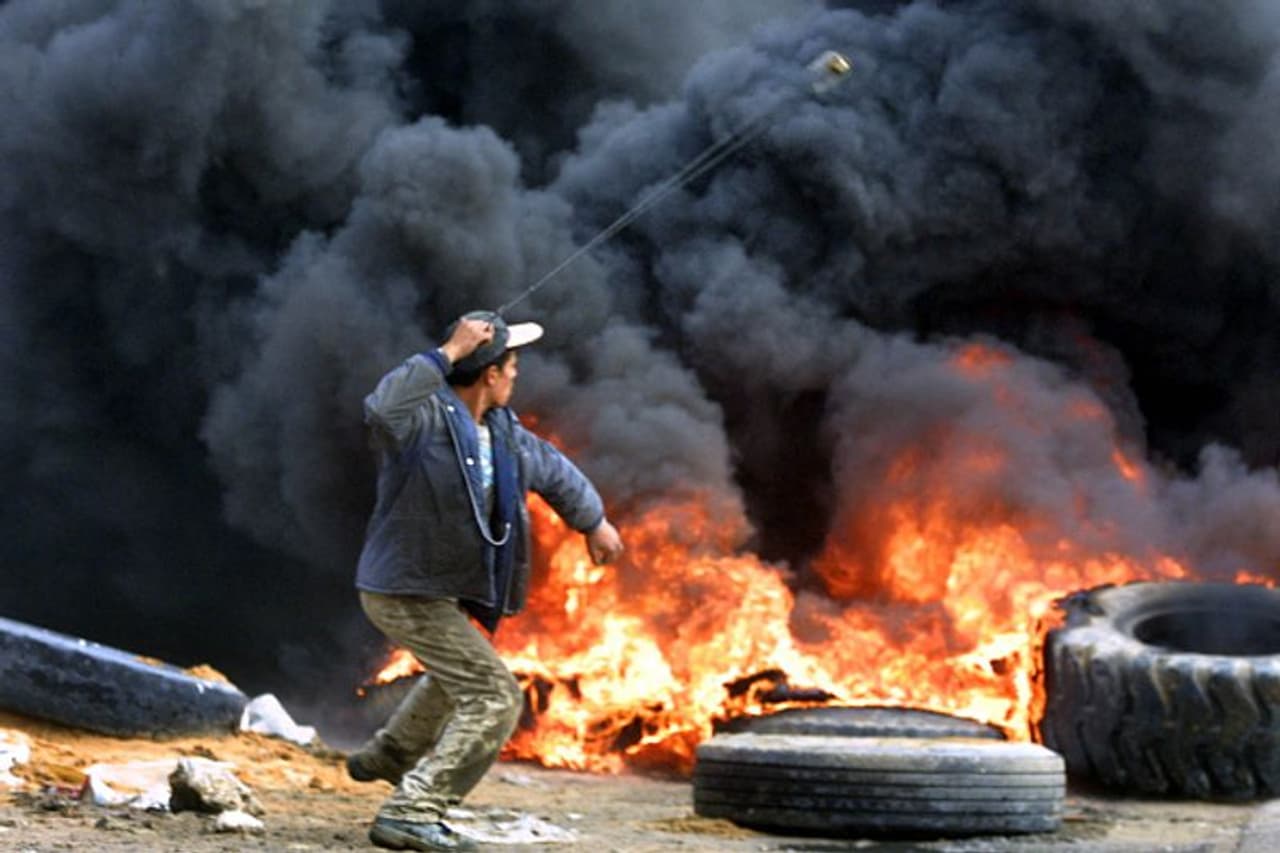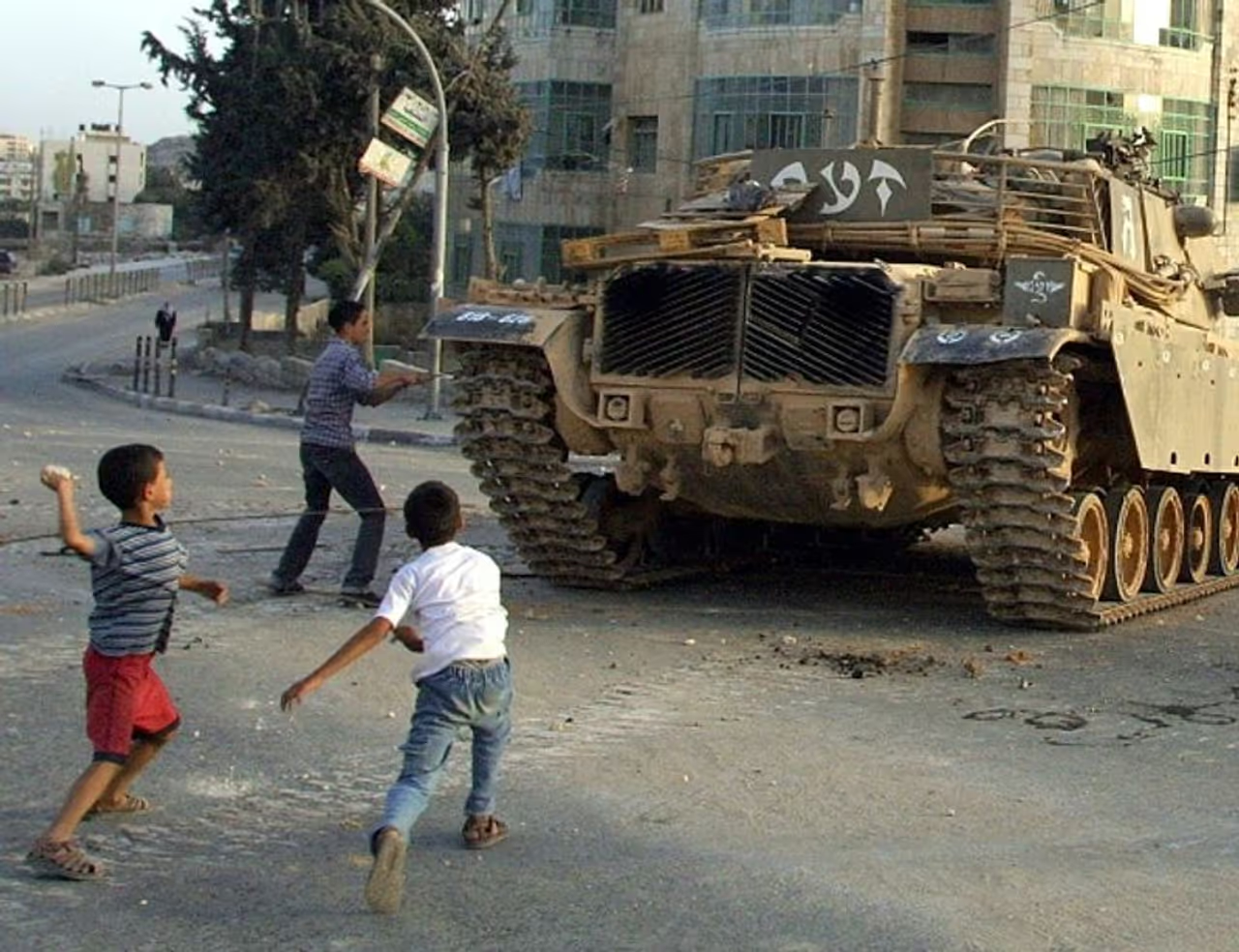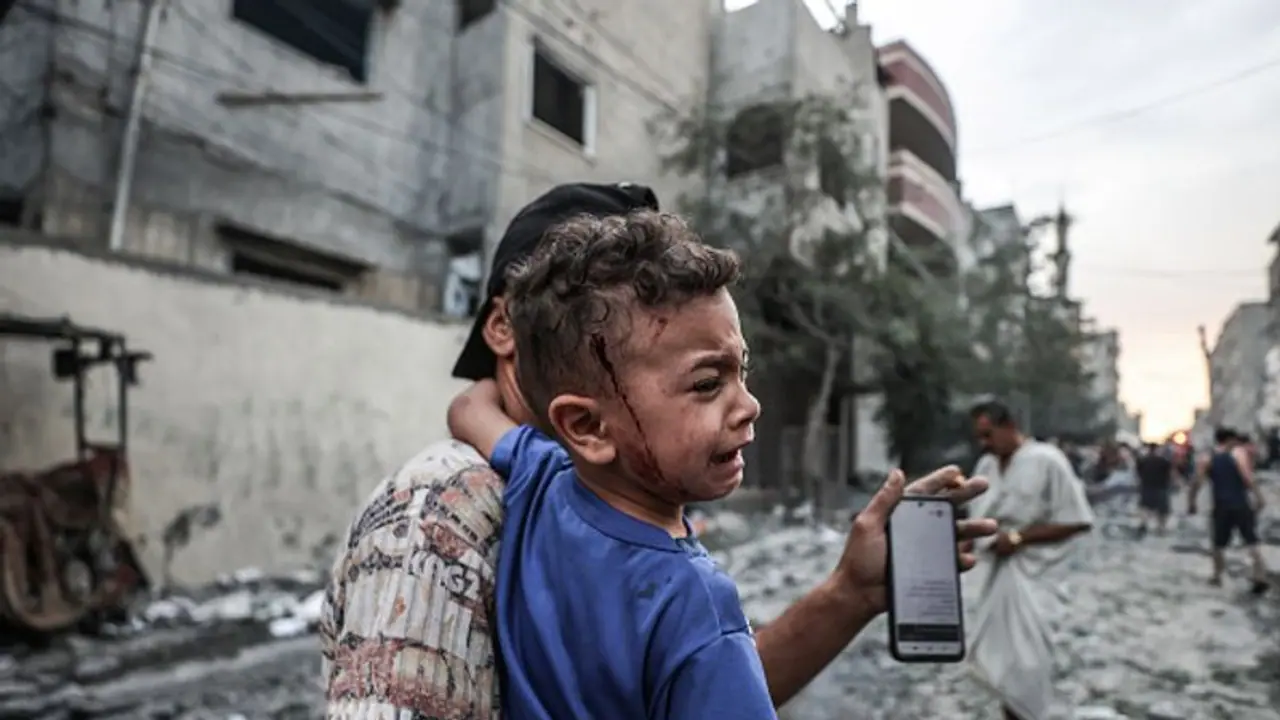The Arabs of Palestine came under relentless attack as the call for a separate Jewish state gained popularity in the West, particularly at the US's instigation. As a result, the birth of a nation was associated with a lengthy history of battle.
A year after India gained freedom, Israel declared its independence. Conflict with the Palestinian Arabs arose as the Jewish survivors of the Holocaust started to establish their kingdom in the Promised Land. The Arabs of Palestine came under relentless attack as the call for a separate Jewish state gained popularity in the West, particularly at the US's instigation. As a result, the birth of a nation was associated with a lengthy history of battle. On their own territory, killings of Palestinians persisted. In the most recent battle, Israeli Prime Minister Benjamin Netanyahu has pledged to turn the Palestinians into "simply dust."

The Jews succeeded in keeping the Palestinian region under constant military threat for more than a century. Wars fought between Israeli and Arab armies over complicated historical, political, religious, and territorial issues have a long history in Palestine and elsewhere. An Arab majority and a Jewish minority occupied the region when Britain won the First World War and took control of Palestine 100 years ago. The West later increased its insistence that the Jews establish a nation-state on the territory they claimed to be their "ancestral home." However, Palestinian Arabs, who have lived there for centuries, also claim the land and oppose the Western demand. Between World War I and World War II, the number of Jews fleeing persecution in Europe and fleeing persecution in Europe during Hitler's Holocaust steadily increased. In 1947, clashes began between Palestinian Arabs and Jews. Britain failed to find a solution. Finally, the decision came before the United Nations (UN). But the Arab countries declared war. Soon after, in 1949, Jewish leaders declared themselves the independent state of Israel. And so begins the 75-year history of modern warfare in the Middle East. Palestine is not the only adversary in Israel's war history today. The reality is that on the enemy side are all the countries that share a border, including Egypt, Jordan, Syria and Lebanon.

1948: Arab-Israeli War (November 1947 – July 1949)
The Arab-Israeli War of 1948 was the first war fought in the region shortly after the creation of independent Israel. The conflict started as a six-month civil war and lasted for two years. Hundreds of Palestinians were driven from their homes and it was described as 'Al Naqba' or 'The Catastrophe'. Neighboring Arab countries including Egypt, Jordan, Syria, Iraq and Lebanon also suffered the brunt of the more than a year-long war. Between February and July 1949, Israel reached a temporary agreement with the bordering Arab states (Egypt, Jordan, Lebanon, and Syria) and determined its own borders. This war is known as the 'War of Independence' in Israel. After each war, Israel continued to expand its borders.
Palestinian Fedayeen Revolt (1950-1960)
In the 1950s and 1960s, Palestinian attacks and reprisals carried out by the Israeli Defense Forces are known as the Palestinian 'Fedayeen Revolt'. The military operations were in response to the Fedayeen, who had infiltrated Israel to launch attacks against Israeli civilians and soldiers by Arab guerrillas from Syria, Egypt, and Jordan against an already strong Western-backed Israel. The Palestinians called the Fedayeen 'freedom fighters' and Israel called them 'terrorists'. Israel's retaliatory measures were aimed at achieving a high 'blood cost' on the enemy side. Israel claimed at the time that the bloodshed was to deter them from future attacks.
Suez Crisis (October 1956)
With the coming to power of Egyptian President Gamal Abdel Nasser in 1956, tensions increased once more, and on July 26, 1956, Egypt chose to nationalise the Suez Canal after Britain and the United States broke their pledge to fund the construction of the Aswan Dam. Following that, Britain and France joined the conflict with Israel in mind. Israel's war was intended to seize control of the Suez Canal and the Sinai Peninsula. Israeli forces occupied Gaza, Rafah, and Al-Arish within five days of their invasion of the Sinai Peninsula. Israel's occupation of the Sinai proved successful, but the US, the USSR, and the UN insisted that Israel leave.
1967: The Six-Day War
Israel engaged in the Six-Day War, a brief but decisive conflict with Egypt, Jordan, and Syria in 1967. Syria had a major role in this war. Syria's bombing of Israeli settlements on the Golan Heights increased. On the front lines of battle were Egypt, Jordan, and Syria, while Iraq, Saudi Arabia, Kuwait, and Algeria supplied military support. The Syrian and Egyptian air forces suffered significant losses as a result of Israeli counterattacks backed by the US. Israeli forces won the conflict, taking control of the Sinai Peninsula, the Gaza Strip, and the West Bank while forcing Syrian forces off the Golan Heights.
1967-1970
The war started after the Six-Day War in 1967 and lasted until 1970. A limited war was fought between the Israeli army and the armies of the Republic of Egypt, the USSR, Jordan, Syria, and the Palestine Liberation Organization. The war was to retake the Sinai region from the Israelis, who had been in control of the area since the 1967 Six-Day War. The war finally ended in 1970 when the countries signed a cease-fire agreement.
1973: The Yom Kippur War
The conflict, also known as the October War or the Ramadan War, flared up on and off before becoming a full-fledged war when Egypt and Syria unexpectedly attacked Israel on Yom Kippur. Despite initial challenges, Israel finally defeated the Arab invaders and crossed the Suez Canal to establish an army outpost in the West Bank. The Israeli military then entered Syrian and Egyptian territory. The Islamic holy month of Ramadan saw Israel engaged in combat. When Israel and Egypt formally agreed to a cease-fire, it finally came to an end.
Palestinian Revolt in South Lebanon (1971-1982)
The Palestine Liberation Organization (PLO) moved from Jordan into South Lebanon, attacking the Galilee and making it a base of international operations. In 1978, Israel launched Operation Litany. This was the first large-scale Israeli occupation of Lebanon. A battle by the Israel Defense Forces to drive PLO forces out of the area. Continued ground and rocket attacks and Israeli retaliation eventually led to war in 1982.
Lebanese Civil War (1975-'90)
Although this war did not take place on Israeli soil, Israel actively participated in the Lebanese Civil War. Israel's intervention was primarily to counter the influence of Palestinian militants and then Hezbollah in southern Lebanon. However, Israel's goal was to save the border by maintaining unrest in the neighboring countries. The Israeli army held a buffer zone in southern Lebanon until their withdrawal in 2000.
1982 Lebanon War
The war began on June 6, 1982, when the Israel Defense Forces invaded southern Lebanon and drove the PLO out of the area. The Israeli government ordered the attack in response to the assassination attempt by the Abu Nidal organization against the British Israeli ambassador, Shlomo Argov, and the ongoing terrorist attacks in northern Israel by Palestinian guerrilla groups based in Lebanon. The war resulted in the expulsion of the PLO from Lebanon and the creation of an Israeli security zone in southern Lebanon. This was six weeks before Israel had fully withdrawn from Sinai. Tensions between Israel and Palestine escalated.
South Lebanon Conflict (1985-2000)
The Israel Defence Forces and its Lebanese Christian proxy militias engaged in a nearly 15-year war in southern Lebanon against Lebanese Muslim insurgents supported by Iran's Hezbollah. This conflict took place within what the Israelis refer to as a "security zone."
The First Intifada (1987-1993)
The First Intifada, also known as the First Palestinian Intifada, the intifada, or the Intifadah, was a prolonged period of violent rioting and protests by Palestinians in Israel and the Palestinian Territories.

The Second Intifada (2000-2005)
There was a lot of bloodshed during the second Palestinian uprising, which started in late September 2000. During the riots known as the Intifada, Israel's weapons erupted in reaction to stone-throwing from the Palestinian areas.
Second Lebanon War (2006)
The military operation was launched in response to the kidnapping of two Israeli reserve soldiers by Hezbollah. The clashes were mainly between Hezbollah paramilitary forces and the Israeli army. In July 2006, Hezbollah, with its extensive rocket arsenal, launched an operation into northern Israel in response to previous Israeli attacks, killing many Israeli soldiers and causing civilian injuries and casualties. Hezbollah wanted to pressure the country to release Lebanese prisoners. In Israel's counterattack, more than a thousand Lebanese were killed and about a million fled the country. Although the Palestinian territories were not directly involved in the Second Lebanon War, regional dynamics and conflicts influenced it. While many Arab leaders criticized Hezbollah for inciting violence, The group's ability to immobilize the Israeli Defense Forces won praise across the Arab world. The war ended after Israel lifted its naval blockade of Lebanon on 8 September 2006 under a United Nations-brokered ceasefire agreement.
Gaza War or Operation Cast Lead
This was an armed battle that lasted three weeks between Israel and Hamas during the winter of 2008–2009. After Israel initiated a military campaign in the Gaza Strip in December 2008 in response to Palestinian rocket firing, the conflict broke out. Three weeks of fighting resulted in substantial losses for both sides. "Operation Cast Lead" refers to Israel's use of military force in response to rocket firing from the Gaza Strip. On December 27, 2008, Israel launched their offensive with a surprise airstrike. Israel wanted to halt rocket launches and the import of weapons into Gaza. Israeli forces assaulted police stations, government buildings, civilian and military targets, and other objectives in the first attack. On January 18, Israel declared the fighting over, and on January 21, it retreated.
Operation Pillar of Defense and Operation Protective Edge (2012-14)
On 14 November 2012, Israel launched an air force operation called 'Pillar of Resistance' against Hamas and the Islamic Jihad leadership in Gaza. It lasted for eight days resulting in several deaths.
2014 Gaza War
Operation Protective Edge II, sometimes referred to as the 2014 Gaza War, was started by Israel on July 8, 2014, one of the worst recent wars between Israel and Hamas, that lasted for 50 days.
Gaza-Israel conflict (2021)
Conflict in May 2021 started with skirmishes in Israel's East Jerusalem, when Palestinians asserted their right to self-defense, the Operation Guardian of the Walls crisis between Israel and Palestine. Tension increased as a result of clashes at Al-Aqsa Mosque and Israeli threats to expel Palestinian families from the Sheikh Jarrah neighbourhood. During the 11-day combat, 250 people in Gaza and 13 Israelis lost their lives. The attacks were even more fierce because of the current Iran-Israel confrontation and the Syrian Civil War. There were riots between Jews and Arabs even in Israeli cities. Hamas launched military missiles into Israel from Gaza, but Israel's Iron Dome deflected the most lethal rockets. Israel's response was to assault and demolish targets in Gaza.
Operation Iron Swords (2023)
In response to a barrage of rocket attacks by the Palestinian armed group, Hamas, in southern Israel on Saturday morning, the Israeli Army launched 'Operation Iron Swords' in the Gaza Strip hours after declaring a state of war. The Israel Air Force launched an attack with dozens of fighter jets targeting the Palestinian militant outfit Hamas in the Gaza Strip in several locations.
